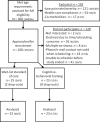Changes in coping, pain, and activity after cognitive-behavioral training: a randomized clinical trial for pediatric sickle cell disease using smartphones
- PMID: 25503599
- PMCID: PMC4424076
- DOI: 10.1097/AJP.0000000000000183
Changes in coping, pain, and activity after cognitive-behavioral training: a randomized clinical trial for pediatric sickle cell disease using smartphones
Abstract
Objectives: We examined the outcomes of a cognitive-behavioral therapy (CBT) intervention for pain in pediatric sickle cell disease (SCD) using smartphones as a novel delivery method.
Materials and methods: Forty-six children with SCD received CBT coping skills training using a randomized, waitlist control design. The intervention involved a single session of CBT training and home-based practice using smartphones for 8 weeks. Pre-post questionnaires between the randomized groups were used to evaluate changes in active psychological coping and negative thinking using the Coping Strategies Questionnaire. Daily diaries completed by the full sample during the treatment period were used to assess whether CBT skill use was related to reductions in next-day pain intensity and increases in same-day functional activity.
Results: The pre-post group comparison suggested that the youth increased active psychological coping attempts with the intervention. Daily diary data indicated that when children used CBT skills on days with higher pain, there were reductions in next-day pain intensity. There was no such association between skill use and functional activity.
Discussion: CBT coping skills training supported using smartphones can increase coping and reduce pain intensity for children with SCD; however, additions to the study protocols are recommended in future studies. Advantages and caveats of using smartphones are also discussed.
Trial registration: ClinicalTrials.gov NCT00386048.
Figures
References
-
- Anie KA. Psychological complications in sickle cell disease. Br J Haematol. 2005;129:723–729. - PubMed
-
- Edwards CL, Scales MT, Loughlin C, Bennett GG, Harris-Peterson S, De Castro LM, Whitworth E, Abrams M, Feliu M, Johnson S, Wood M, Harrison O, Killough A. A brief review of the pathophysiology, associated pain, and psychosocial issues in sickle cell disease. Int J Beh Med. 2005;12:171–179. - PubMed
-
- Gil KM, Williams DA, Thompson RJ, Kinney TR. Sickle cell disease in children and adolescents: the relation of child and parent pain coping srategies to adjustment. J Pediatr Psychol. 1991;16:643–663. - PubMed
-
- Shapiro BS, Dinges DF, Orne EC, Bauer N, Reilly LB, Whitehouse WG, Ohene-Frempong K, Orne MT. Home management of sickle cell-related pain in children and adolescents: natural history and impact on school attendance. Pain. 1995;61:139–44. - PubMed


